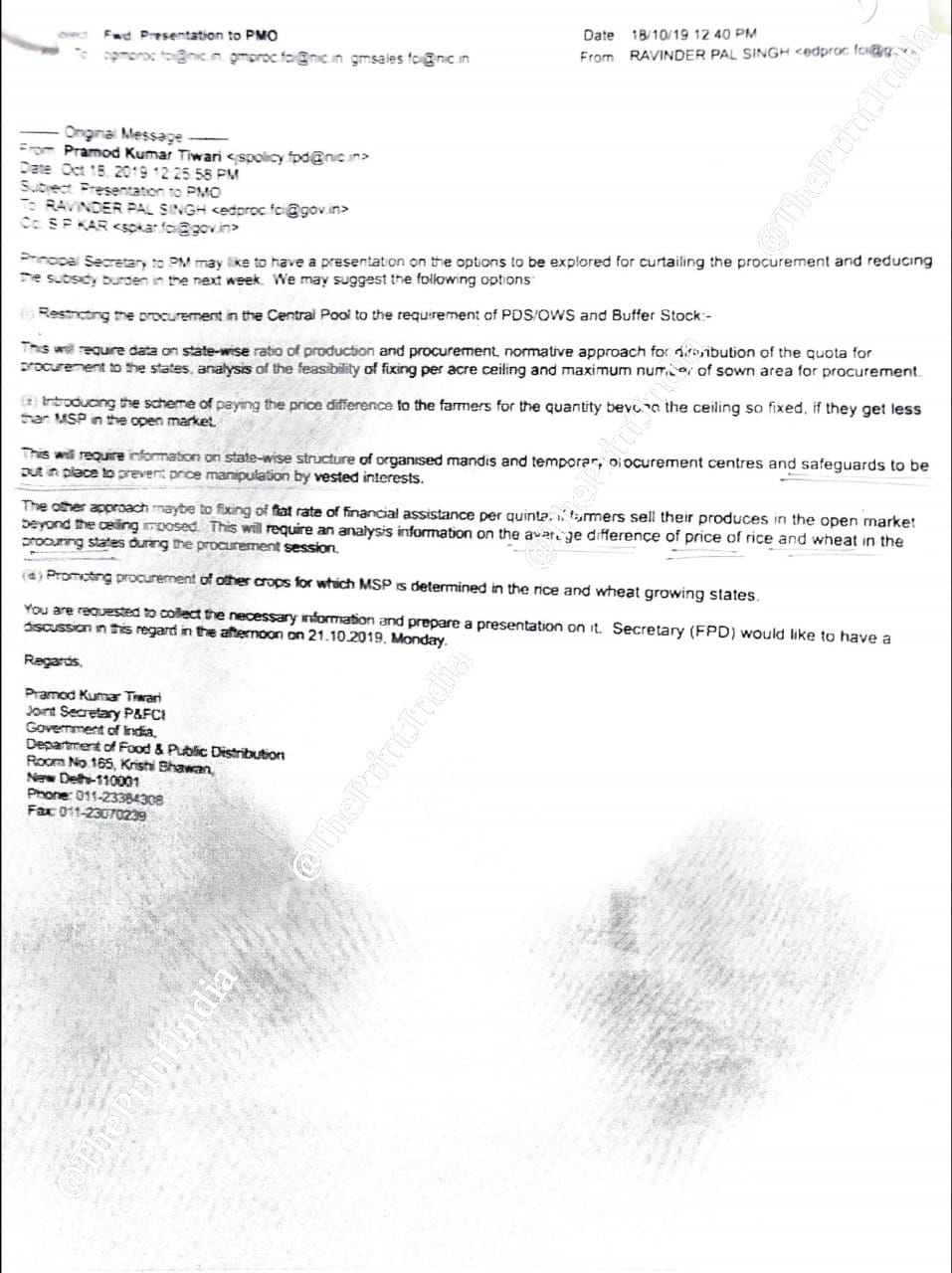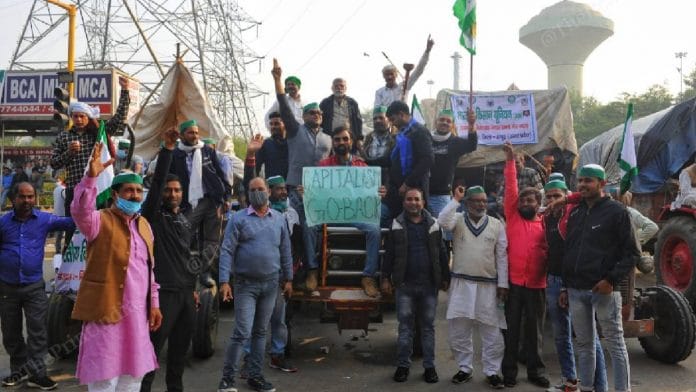Chandigarh: One of the reasons Punjab’s agitating farmers have consistently rejected the Modi government’s promises with regard to procurement and MSP is because they believe that, since October 2019, the government has been “actively considering” a proposal to curtail procurement of wheat and rice from the state.
This belief is rooted in an October 2019 letter from the Union food department to the Food Corporation of India (FCI), and a March 2020 report by the Commission for Agricultural Costs and Prices (CACP), that recommends MSPs for different crops.
The FCI is the nodal agency for procurement of crops by the government for the central pool. The procured crops, mainly wheat, rice and pulses, are used in the public distribution system as also for maintaining a buffer stock.
The FCI purchases these crops at minimum support price (MSP) — a threshold to assure the farmers don’t get below a certain price.
Punjab and Haryana are the dominant contributors of wheat and rice to the central pool.
The protest against the farm laws is being spearheaded by farmers from Punjab, who have been demanding that the Modi government continue the procurement system and make MSP a legal right. The government has constantly assured farmers that the three farm laws won’t affect either the MSP framework or the procurement process.
The 18 October 2019 email was sent by Pramod Kumar Tiwari, the then Union joint secretary (policy and FCI), department of food and public distribution, to Ravinder Pal Singh, then an executive director in the FCI.
Bharatiya Kisan Union (Rajewal) president Balbir Singh Rajewal had referred to Tiwari’s letter during a press conference at the Delhi-Haryana Singhu border — where the protesting farmers have been camping for over a week — on 30 November. He had flagged it while making a point that the farmers’ apprehensions are not misplaced.
Asked about the mail, Alpana Pant Sharma, information officer, Ministry of Consumer Affairs, Food and Public Distribution said: “These are part of the internal happenings in the department and I cannot give information beyond what I am authorised to.”
ThePrint also reached the minister in-charge, Piyush Goyal, and secretary Sudhanshu Pandey through email and text messages, but there was no response until the time of publishing this report.
Asked about the letter, Arshdeep Singh Thind, FCI Regional Manager for Punjab and Haryana, said the corporation was only a procurement agency and followed whatever instructions were given to it. “We don’t look into policy matters,” he added.
Also Read: Farmers’ protest a big challenge for Modi. Bigger than demonetisation, GST
Govt studying three options
The 18 October email, a copy of which has been accessed by ThePrint, seeks certain information from the FCI, saying that a presentation has to be made to the Principal Secretary to the Prime Minister on the issue.

The email then lists the three options that are being suggested to restrict procurement.
The first is “restricting the procurement in the central pool to the requirement of public distribution system/other welfare schemes and buffer stock”.
To study this option, the email sought data on the state-wise ratio of production and procurement, as also an analysis of the “feasibility of fixing per-acre ceiling and maximum number of sown area for procurement”.
The second option under study, the email states, is “introducing the scheme of paying the price difference to the farmers for the quantity beyond the ceiling so fixed, if they get less than MSP in the open market”.
For this, the government required information on the state-wise structure of organised mandis and temporary procurement centres, as also “safeguards to be put in place to prevent price manipulation by vested interests”.
The government said an alternative approach to this option could be fixing a “flat rate of financial assistance per quintal” in case the farmers who fall outside the ceiling sell their produce in the open market. For this, it sought “information on the average difference of price of rice and wheat in the procuring states during the procurement season”.
The last option listed is to promote procurement of other crops for which MSP is determined in the rice- and wheat-growing states.
Also Read: Thatcher or Anna moment? Why Modi’s choice on farmers’ protest will shape future politics
CACP report fueled apprehensions
During the press meet, Rajewal also cited a CACP report as a factor stoking suspicions among farmers that the government is going to withdraw from procurement or curtail it.
The CACP functions under the central government’s department of agriculture, cooperation and farmers’ welfare.
In a March 2020 report on ‘Price Policy for Kharif Crops’, the CACP made several references to restricting procurement in Punjab and Haryana.
“The policy of open-ended procurement has led to excess grains stocks and adversely affected crop diversification. The commission reiterates its earlier recommendation that the central government should review open-ended procurement policy and take a policy decision to restrict procurement from states like Punjab and Haryana where substantial groundwater depletion has occurred and other states that give bonus,” states the report.
The CACP report further suggests that the government take the “ceiling” route to reduce its procurement burden. “Central government should review open-ended procurement policy and take a policy decision to restrict procurement from small and marginal farmers and putting a ceiling for procurement of two hectares marketed surplus from semi-medium, medium and large farmers from states that impose market fees/cess/levies beyond 3-4 per cent of MSP, or give bonus on top of MSP,” the report adds.
The CACP has also emphasised the increased storage and subsidy bill of the Government of India because of open-ended procurement, listing the benefits of imposing a ceiling on procurement.
“For instance, if a ceiling of two hectares rice marketed surplus quantity is imposed, procurement from Punjab and Haryana will reduce to about 10.3 million tonnes from the current procurement of about 15.3 million tonnes,” the report states.
Speaking to ThePrint, a farmer leader said an open-ended procurement policy “means the government (through FCI) has to buy (at MSP) every grain of wheat and rice that the Punjab and Haryana farmers bring to the mandis for sale”.
“The government wants to end this system through these legislations. Once the FCI is not procuring the crop from us, we will be left at the mercy of the private buyer who may or may not give us the MSP,” the leader added.
Farmers are also opposed to the ceiling option. “A ceiling of two hectares means that if a farmer has less than two hectares of land, his entire crop of wheat or paddy will be procured. But for farmers with more than two hectares, the government will restrict procurement to two hectares,” a second farmer leader from Punjab said. “The crop on the rest of the land will have to be sold in the open market, where he may or may not get the MSP.
“By saying that this ceiling will be imposed in states that impose market fees beyond 3-4 per cent of MSP… basically means it will be imposed in Punjab where the fees is 6 per cent,” he added.
Also Read: How IT professional from Punjab is using Twitter to support farm protests & counter criticism






